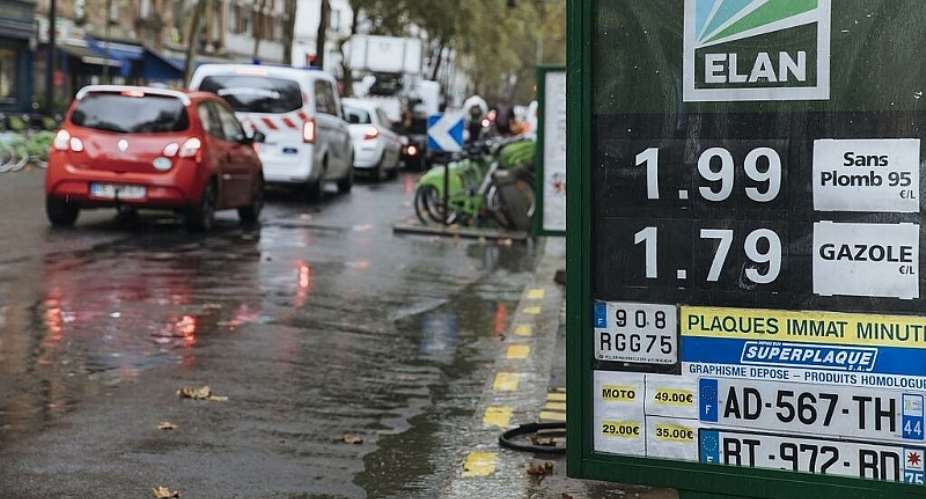As French ministers gather on Tuesday to vote through the first part of the 2022 budget, the topic of petrol vouchers for low-income households will be high on the agenda. This comes as President Emmanuel Macron's government seeks to limit the damage from surging energy prices six months away from the presidential election.
After the traditional question and answer session in parliament on Tuesday, ministers will vote on the fiscal law proposal (PLF) which concerns revenue and address the hot-button topic of the so-called "tariff shield".
The government has promised to cap retail gas prices this month until March, when it hopes the price spike will fade.
It also plans to cut a surcharge on electricity prices to limit a price increase to four percent in the first half of 2022, instead of the 12 percent that could otherwise have been expected.
The minister for public spending Olivier Dussopt has warned that a cap on electricity alone would see the government lose around 5.1 billion euros of income in 2022.
The French government is expected to announce its decision on the energy issue "by the end of the week," spokesman Gabriel Attal told RTL radio on Tuesday.
"The last stages of negotiation are underway. What is important is to make a decision and create a measure which will be simple, fair and efficient," he said.
Historic high at the pump
The government has already scrambled in recent weeks to cap gas and electricity prices and increase handouts to help the poor pay winter heating bills as energy prices jumped worldwide on the strength of the post-pandemic economic recovery.
With economic growth set to top 6% this year as the Covid-19 crisis subsides, the economy had been viewed as Macron's strong suit heading towards the April election, in which he is widely expected to seek a second five-year term.
But the price hike could hurt his record by eclipsing purchasing power gains during his presidency, which were fuelled largely by tax cuts.
As petrol prices have steadily climbed in recent weeks, the government has faced growing pressure to cut taxes paid at the pump, which can amount to up to 60% of what drivers pay.
The most recent increase saw prices reach a historic high of €1,56/l for diesel on average and €1,62/l for unleaded petrol.
Petrol vouchers
"I prefer 'petrol cheques' to a lowering of taxes", Finance Minister Bruno Le Maire told Europe 1 radio.
"Ideally, we need to help people who need it the most," he stressed, adding that he was aware that many French people were "still over the limit" in terms of revenue and were not able to benefit from financial aid.
Le Maire also argued that cutting taxes not only be costly to public finances but would also amount to a subsidy for fossil fuels at a time when the government was trying to wean the economy off them.
Environment Minister Barbara Pompili also made the case for petrol vouchers, but added that it was a complex process to put in place.
"We don't have a database with the number of people who need their cars to go to work, for example," Pompili said on Monday.
Unions are concerned that the price of fuel will particularly impact employees in regional areas of France, who don't have access to public transport, who live far away from their place of work or who work off-peak hours.
Spectre of 'gilets jaunes'
With energy prices a big part of households' budgets, tax on them can be a sensitive issue in France and was in fact the trigger to the November 2018 Yellow Vest protests, a movement which brought France to a standstill.
Once again, squeezed purchasing power has become a top theme at recent Yellow Vest protests.
"There are mothers-of-two who have to chose between paying their energy bill and feeding their children," one protestor told Reuters TV at a demo earlier this month. "Therein lies the problem: what's left to live by after we've paid the energy bill?"
Although right and left factions of the government are not involved directly in Tuesday's budget vote, they have been increasing their pressure in the ruling party and have put forward their own proposals for defending purchasing power in the face of the energy price hikes.





 Lay KPMG audit report on SML-GRA contract before Parliament – Isaac Adongo tells...
Lay KPMG audit report on SML-GRA contract before Parliament – Isaac Adongo tells...
 Supervisor remanded for stabbing businessman with broken bottle and screwdriver
Supervisor remanded for stabbing businessman with broken bottle and screwdriver
 NDC watching EC and NPP closely on Returning Officer recruitment — Omane Boamah
NDC watching EC and NPP closely on Returning Officer recruitment — Omane Boamah
 Your decision to contest for president again is pathetic – Annoh-Dompreh blasts ...
Your decision to contest for president again is pathetic – Annoh-Dompreh blasts ...
 Election 2024: Security agencies ready to keep peace and secure the country — IG...
Election 2024: Security agencies ready to keep peace and secure the country — IG...
 People no longer place value in public basic schools; new uniforms, painting wil...
People no longer place value in public basic schools; new uniforms, painting wil...
 'Comedian' Paul Adom Otchere needs help – Sulemana Braimah
'Comedian' Paul Adom Otchere needs help – Sulemana Braimah
 Ejisu by-election: Only 33% of voters can be swayed by inducement — Global InfoA...
Ejisu by-election: Only 33% of voters can be swayed by inducement — Global InfoA...
 Minority will expose the beneficial owners of SML, recover funds paid to company...
Minority will expose the beneficial owners of SML, recover funds paid to company...
 Prof. Opoku-Agyemang has ‘decapitated’ the NPP’s strategies; don’t take them ser...
Prof. Opoku-Agyemang has ‘decapitated’ the NPP’s strategies; don’t take them ser...
